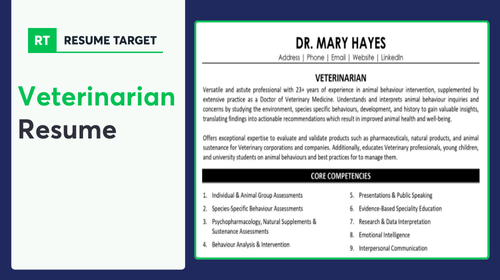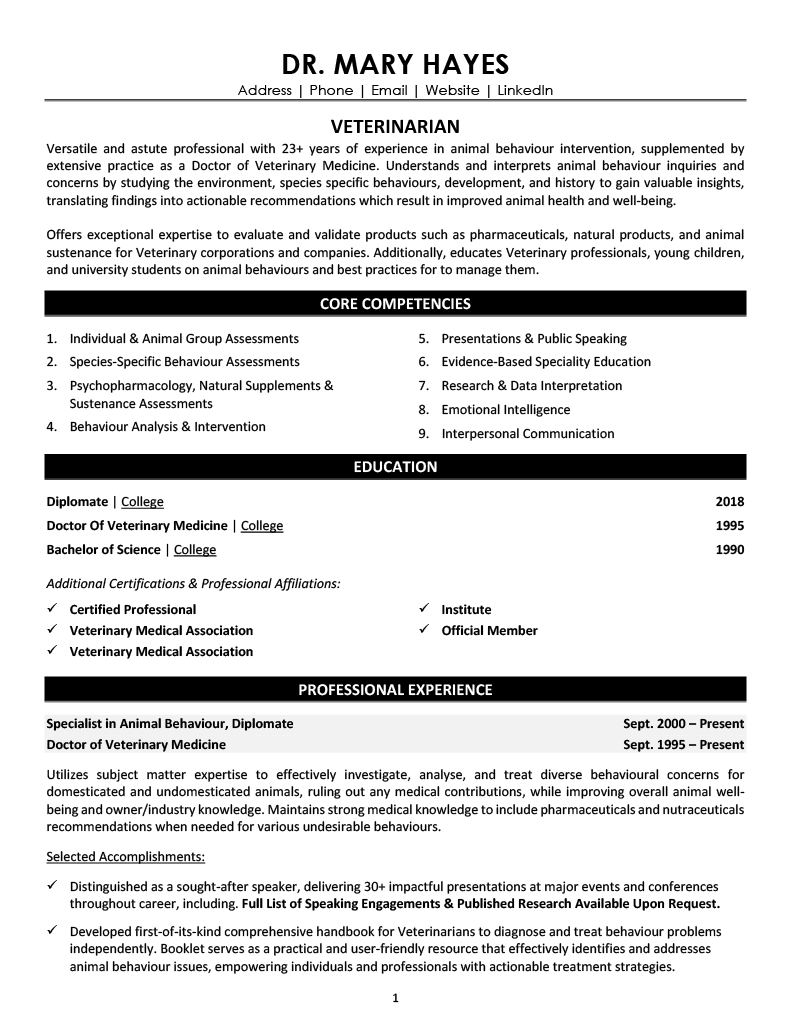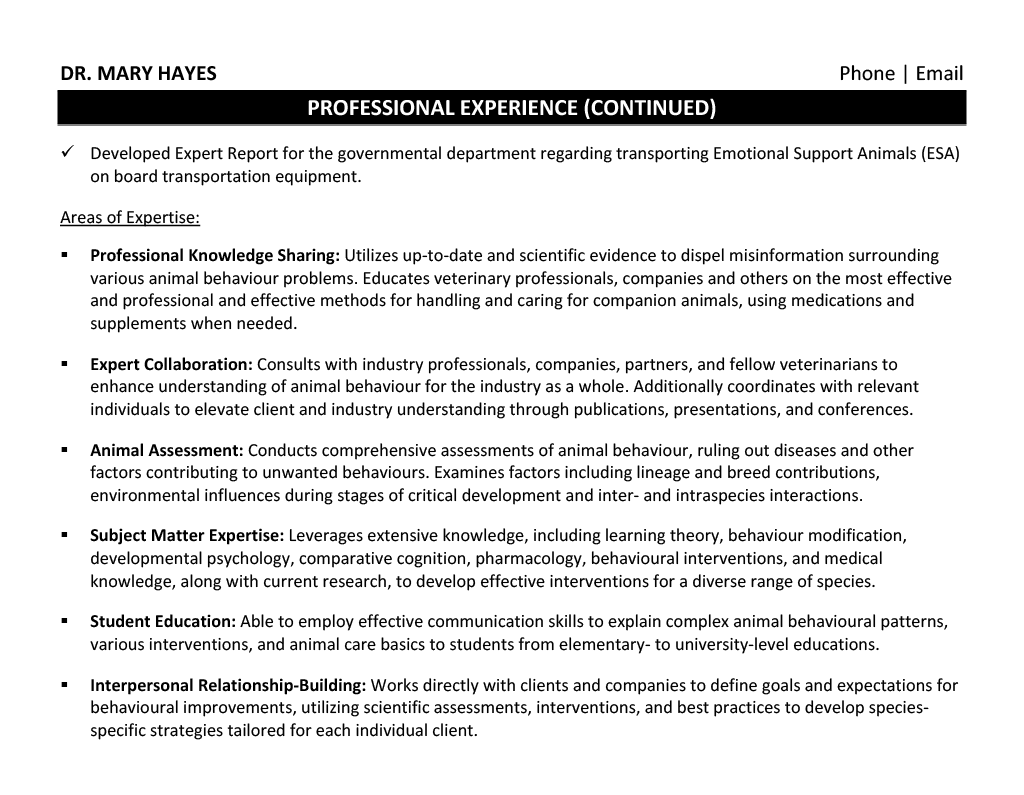

Treating animals is your passion, but capturing your diverse medical skills on paper can feel like herding cats. Your expertise spans multiple species, complex procedures, and countless emergency scenarios, yet your resume might not reflect this range.
Are you struggling to showcase both your clinical excellence and your client communication abilities? A well-crafted veterinary resume needs to demonstrate your medical expertise while highlighting your ability to work with both animals and their concerned owners.
Resume Target specializes in helping veterinarians translate their daily challenges into powerful career documents. We know how to present your surgical skills, diagnostic abilities, and compassionate care in a way that catches the attention of leading veterinary practices and hospitals.


As the ultimate advocates for animal health and welfare, veterinarians don't just treat pets – they serve as medical detectives, surgeons, and public health guardians who diagnose and treat medical conditions across species while protecting public health through disease prevention.
Your role as a veterinarian requires mastering multiple disciplines – from performing intricate surgeries and interpreting diagnostic tests to prescribing medications and counseling pet owners – all while adapting your approach for patients who can't verbally describe their symptoms.
Whether you're drawn to caring for beloved family pets, ensuring food safety through livestock care, or advancing veterinary medicine through research, the veterinary field offers diverse career paths that let you combine your passion for science with your commitment to animal welfare.
Let's talk about the exciting earning potential in veterinary medicine! As a Veterinarian, your passion for animal care can translate into a rewarding career with impressive compensation. Starting salaries begin in the lower range, but here's what's exciting - as you gain experience and potentially specialize, your earning potential can more than double. And guess what? Working in private practice typically offers the highest earning potential, while positions in education and government provide stable, competitive wages with excellent benefits.
Figures from: U.S. Bureau of Labor Statistics
Starting as a veterinarian requires a DVM degree, but your career can soar from there. From private practice to specialized roles, you'll find numerous paths to advance while helping animals thrive.
Beyond basic animal care, advancing in veterinary medicine requires a combination of clinical expertise and leadership capabilities.
- Advanced surgical techniques - Veterinary diagnostic technology - Practice management - Client relationship managementStarting your veterinary career journey can begin with entry-level positions like veterinary assistant or kennel technician, giving you valuable hands-on experience while working toward your DVM degree.
To build a strong foundation for your veterinary career, you'll need to develop essential skills including strong interpersonal communication abilities for client interactions, alongside technical expertise and problem-solving capabilities.
Requirements from Pick The Brain
From California's bustling pet care scene to Florida's growing animal health sector, vet jobs are thriving nationwide.
Figures from U.S. Bureau of Labor Statistics
Struggling to capture all your experience treating furry, feathered, and scaly patients in a way that stands out to veterinary practices and hospitals? This comprehensive, section-by-section guide will walk you through creating a compelling veterinarian resume that showcases your clinical expertise, surgical skills, and compassionate patient care.
If you're like most veterinarians, crafting the perfect resume summary feels more challenging than performing a complex surgery - after all, it's much easier to demonstrate your skills in person with animals than to write about them on paper.
While you excel at diagnosing medical conditions, performing surgeries, and building trust with both pets and their owners, translating these invaluable skills into a compelling summary that catches a hiring manager's attention requires a different kind of precision.
How would you describe your veterinary philosophy and approach to animal care in a way that sets you apart from other practitioners?
Reason: Your care philosophy reveals your core values and professional identity, helping potential employers understand how you'll fit into their practice culture and approach to patient care.
What combination of species specializations, medical interests, and clinical environments have shaped your veterinary career path?
Reason: This helps frame your professional narrative and immediately signals to employers your scope of practice and areas of expertise, allowing them to quickly assess your fit for their specific needs.
How do you balance the technical aspects of veterinary medicine with the interpersonal skills needed for client communication and team collaboration?
Reason: Modern veterinary practice requires both medical expertise and strong soft skills - highlighting this balance demonstrates your understanding of the full scope of the role and your ability to handle its various demands.
As a veterinarian, you need to showcase both your clinical expertise and practical hands-on abilities, from surgical skills and diagnostic capabilities to your experience with specific animal species and medical equipment.
Your resume should balance technical veterinary competencies like disease management and surgical procedures with essential soft skills such as client communication and emergency response, while highlighting any specialized areas like exotic animal medicine or veterinary dentistry.
Showcase your veterinary expertise by organizing your experience into three powerful sections: a concise role overview highlighting your clinical settings, measurable achievements demonstrating your impact on animal health, and core responsibilities that spotlight your medical and surgical capabilities.
Many veterinarians struggle to translate their daily animal care and medical procedures into compelling achievements that demonstrate their true business value. Transform your clinical experience into powerful metrics by connecting patient outcomes, practice growth, and operational improvements to showcase your comprehensive impact on both animal health and practice success.
A strong responsibilities section demonstrates how veterinarians provide comprehensive medical care while managing client relationships and leading clinical teams. Your duties should showcase both technical expertise and ability to communicate complex medical information to pet owners, while highlighting your contribution to animal health and clinic operations.
Your veterinary credentials demonstrate your expertise in animal healthcare and commitment to professional development. Start with your Doctor of Veterinary Medicine (DVM) degree and follow with relevant state licenses, board certifications, and specialized training that align with your target practice area.
Now that you've created a strong foundation using Resume Target's comprehensive resume writing guidelines, you're ready to transform your veterinary credentials into a powerful application tool.
While many veterinary professionals focus solely on customizing their cover letters, tailoring your resume for each specific veterinary position—whether it's a small animal clinic, emergency hospital, or specialty practice—is equally crucial for success.
A customized veterinary resume not only helps you navigate through ATS systems by incorporating role-specific keywords, but it also demonstrates to hiring managers that your unique combination of medical expertise, surgical skills, and compassionate care perfectly aligns with their practice's needs.
Ready to make your veterinary resume stand out from the pack? Let's transform your credentials into a compelling story that shows exactly why you're the perfect candidate for your dream veterinary position!
Don't let a lack of professional experience hold you back from pursuing your dream of becoming a veterinarian!
Your DVM education, clinical rotations, and hands-on experience with animals can create a compelling story that showcases your readiness to provide excellent veterinary care.
Focus on highlighting your clinical skills, academic achievements, and any volunteer work or internships at animal hospitals or clinics.
For detailed guidance on structuring your veterinary resume, check out our Student Resume Writing Guide to ensure you're presenting your qualifications in the best possible light.
Your veterinary resume summary is your chance to showcase your clinical rotations, animal care experience, and passionate commitment to animal health and welfare.
Focus on highlighting your hands-on training, specialized skills from your DVM program, and any volunteer work or internships that demonstrate your readiness to practice.
"Compassionate and detail-oriented Veterinarian with comprehensive DVM education and 2+ years of clinical rotation experience in small animal medicine, surgery, and emergency care. Demonstrated expertise in diagnostic procedures, preventive care, and client education through 500+ hours of hands-on training at university teaching hospital. Proven track record of maintaining calm demeanor while handling medical emergencies and delivering exceptional patient care. Seeking associate veterinarian position to provide high-quality veterinary services while continuing to develop surgical and diagnostic skills."
Now's your chance to showcase the rigorous academic journey that prepared you for veterinary medicine - from your pre-vet studies through your DVM program!
Don't just list your degrees - highlight relevant coursework like "Small Animal Surgery" or "Veterinary Pharmacology," and feature impactful clinical rotations and research projects that demonstrate your hands-on experience with animal care.
unavailableRelevant Coursework: Animal Anatomy & Physiology | Clinical Pathology | Veterinary Pharmacology | Small Animal Medicine | Large Animal Surgery | Veterinary Immunology
Key Projects:
Companion Animal Disease Research Project: Conducted comprehensive study on emerging canine respiratory diseases in urban environments, analyzing transmission patterns and developing treatment protocols.
Livestock Health Management Initiative: Collaborated with local dairy farms to establish preventive health protocols and improve herd wellness outcomes.
Leverage your veterinary school training, clinical rotations, and hands-on experience to create a compelling skills section that showcases your ability to provide exceptional animal care while demonstrating your technical expertise and medical knowledge.
As an entry-level veterinarian, your combination of clinical skills, medical knowledge, and compassionate care positions you perfectly for a rewarding career in veterinary medicine, with opportunities in private practice, emergency care, or specialized fields.
When you've spent years mastering complex medical procedures and building meaningful bonds with both pets and their owners, it can feel overwhelming to capture all those skills and emotional intelligence on a single document.
At Resume Target, we understand the unique challenges veterinary professionals face in the medical field, and we've helped countless veterinarians showcase both their clinical expertise and compassionate care abilities.
Our specialized knowledge of the veterinary industry means we know exactly how to highlight your surgical skills, diagnostic capabilities, and client communication strengths in ways that resonate with hiring managers.
With the veterinary field growing more competitive each year and practices seeking multi-skilled professionals, now is the perfect time to transform your resume into a powerful career tool - schedule your free consultation today.
Impress any hiring manager with our Medical resume writing service. We work with all career levels and types of Medical professionals.
Learn More → Medical Resume Writing Services